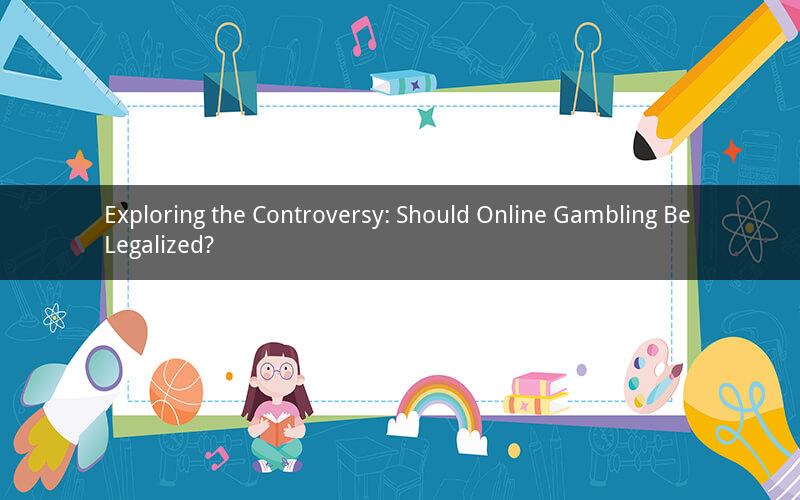
Online gambling has emerged as a popular form of entertainment for millions of people worldwide. The debate surrounding its legality has been ongoing for years, with arguments on both sides. This article delves into the topic of whether online gambling should be legal, exploring the pros and cons associated with this contentious issue.
Pros of Legalizing Online Gambling
1. Economic Benefits
Legalizing online gambling can bring substantial economic benefits to countries. Governments can collect taxes on online gambling revenue, which can be used to fund public services, reduce budget deficits, and create job opportunities in the industry. The gaming sector has the potential to become a significant contributor to a nation's economy.
2. Enhanced Consumer Protection
Legalizing online gambling can lead to better consumer protection. Government regulations can ensure that online gambling sites adhere to strict guidelines, such as age verification, fair play, and responsible gambling practices. This can help prevent issues like fraud, addiction, and underage gambling.
3. Increased Transparency
Legal online gambling platforms are subject to audits and oversight, which enhances transparency. Players can have confidence that the games are fair and the operators are legitimate. This can lead to a more reputable and trustworthy industry, attracting both new and existing customers.
4. Competition and Innovation
Legalizing online gambling fosters competition among operators, leading to innovation and improved services. Operators are incentivized to offer unique game titles, bonuses, and promotions to attract and retain customers. This can result in a more diverse and exciting gaming experience for players.
5. Social Benefits
Legal online gambling can contribute to social benefits. For example, proceeds from gambling taxes can be used to fund addiction treatment programs, support organizations, and other social initiatives. Additionally, the gaming industry can create job opportunities and contribute to local economies.
Cons of Legalizing Online Gambling
1. Increased Addiction Rates
One of the primary concerns regarding legalizing online gambling is the potential for increased addiction rates. Online gambling can be easily accessible, and the fast-paced nature of some games can make it difficult for individuals to control their gambling habits. This can lead to financial, emotional, and psychological problems for both individuals and their families.
2. Underage Gambling
Legalizing online gambling raises concerns about underage gambling. While age verification measures can be implemented, there is always a risk that minors will gain access to these platforms. This can expose young people to potential harm and have long-term negative effects on their lives.
3. Organized Crime Involvement
The illegal online gambling market is often associated with organized crime. Legalizing online gambling may inadvertently provide opportunities for criminal organizations to infiltrate the industry, leading to corruption, money laundering, and other illegal activities.
4. Social Harms
Legal online gambling can lead to social harms, such as gambling-related crime, domestic violence, and financial ruin. The potential for addiction and the availability of easy access to gambling sites can exacerbate these issues.
5. Government Regulation Challenges
Regulating the online gambling industry can be a complex task for governments. Ensuring compliance with regulations, monitoring the market, and enforcing laws can be challenging and costly. This can lead to concerns about the effectiveness and fairness of the regulatory framework.
Frequently Asked Questions
Q1: What is the current legal status of online gambling worldwide?
A1: The legal status of online gambling varies from country to country. Some nations have fully legalized and regulated the industry, while others have banned it altogether. In many cases, online gambling laws are determined at a state or regional level.
Q2: Can legalizing online gambling lead to an increase in gambling addiction?
A2: There is evidence to suggest that legalizing online gambling can contribute to increased addiction rates. However, the extent of this effect is still debated among experts. Implementing strict regulations and providing resources for addiction prevention and treatment can mitigate this risk.
Q3: How can governments ensure the integrity of online gambling sites?
A3: Governments can ensure the integrity of online gambling sites by imposing strict licensing requirements, conducting regular audits, and monitoring the industry closely. This includes implementing age verification measures, enforcing fair play standards, and promoting responsible gambling practices.
Q4: What measures can be taken to prevent underage gambling in legal online gambling markets?
A4: Preventing underage gambling in legal online gambling markets requires a multi-faceted approach. This includes implementing age verification measures, educating young people about the risks of gambling, and promoting responsible gambling practices among adults.
Q5: Can legalizing online gambling help reduce crime rates?
A5: Legalizing online gambling can potentially reduce crime rates by taking the industry out of the hands of organized crime. However, the overall impact on crime rates is still unclear, and it is essential to carefully monitor the effects of legalization on both legal and illegal markets.